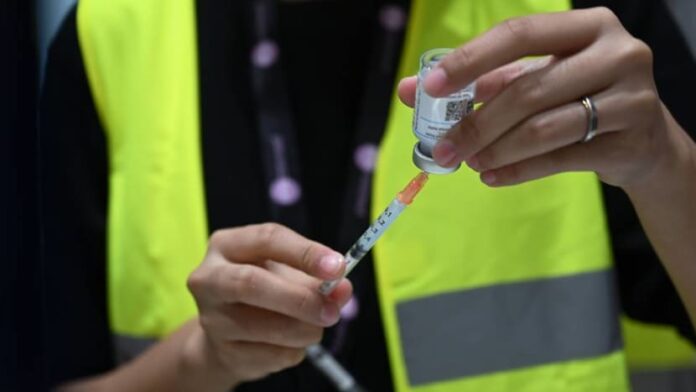Singapore: Health Minister Wang Yikang said on Monday (November 15) that the combination of Pfizer-BioNTech vaccination and Moderna booster injections has a “mild advantage” in reducing the risk of COVID-19 infection.
Citing statistics from a study by the Ministry of Health (MOH), Mr. Ong said that this combination further reduced the risk of infection by 72%.
In contrast, taking the Pfizer-BioNTech booster after the Pfizer-BioNTech vaccination can further reduce the risk of infection by 62%.
Mr. Ong and Kenneth Mak, director of medical services at the Ministry of Health, received a Moderna booster injection after being vaccinated with Pfizer BioNTech.
At the press conference of the COVID-19 multi-ministerial working group, Mr. Ong said that the results of other combinations, such as the use of Moderna vaccination Moderna booster, “may not be so meaningful” because the sample size is “not very large.”
He said that some members of the public have asked the Ministry of Health what kind of mRNA booster they should inject after two injections of the mRNA vaccine.
Mr. Ong said that the COVID-19 vaccination expert committee recommends that the two mRNA vaccines can be used interchangeably, regardless of whether the first two doses are Pfizer-BioNTech or Moderna.
“Therefore, both mRNA vaccines can be used well as boosters, (Moderna as a booster after Pfizer-BioNTech vaccination) has a slight advantage.
“In any case, the two combinations have a very large impact on reducing the severity of the disease.”
“With the booster, the possibility of infection and the possibility of serious illness is further reduced…for the elderly, the impact is very obvious,” he added.
As of Saturday, 85% of Singapore’s population has completed a complete treatment plan or received two doses of the COVID-19 vaccine, while 20% of the population has received a booster shot.
MIS-C update
At the same press conference, Associate Professor Mai updated the number of cases of Children’s Multiple System Inflammatory Syndrome (MIS-C). The current number of cases is 6, which is higher than the previously announced 5 cases.
MIS-C is a high-inflammatory syndrome that can occur two to eight weeks after a child is infected with COVID-19.
Associate Professor Mai said that the age of the six cases ranged from two months to 11 years old. Three of them have recovered and been discharged and continue to receive follow-up care by hospital experts.
Of the remaining children, one was initially admitted to the pediatric intensive care unit but responded well to treatment.
Associate Professor Mai said: “He has been transferred to a general ward. If he continues to recover, he may be discharged soon.”
Another child is being monitored in the highly dependent ward of the hospital and is being treated for other concurrent infections. The remaining children are stable in the general ward.






